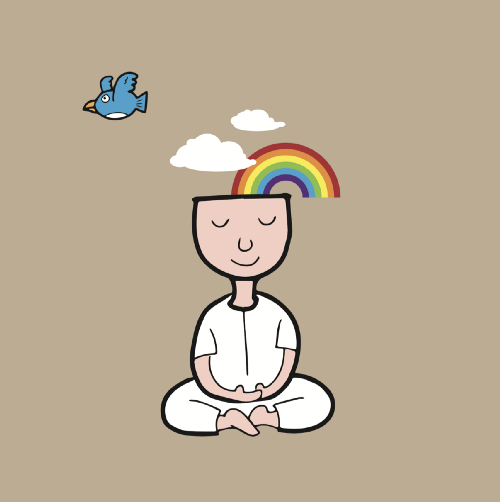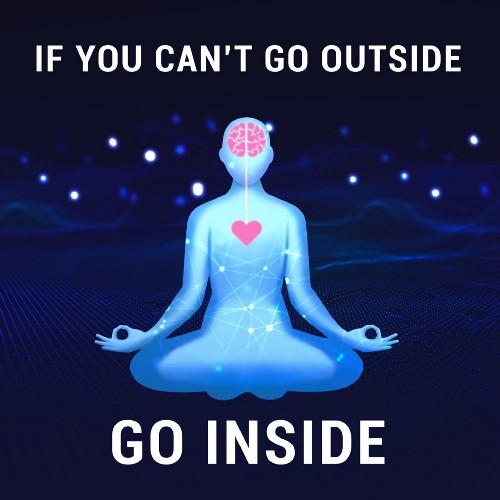Coronavirus has put our world in a state of fight or flight / shock and trauma. Our collective nervous systems via the media and social network streams are flooded with both real crisis information, and a significant amount of mis- and dis- information. The data is confusing and over-consumption of information is addicting.
More than ever, we need to support each other to find inner peace and calm to get to the other side of this with greater resilience and fortitude.
Meditation is one obvious at-home practice you can start now to help you get there. Added bonus — it’s also a way to rewire your limbic system for natural immunity. The immune system is also called “the floating brain” for its ability to communicate with the brain when chronic stress or invading pathogens are causing system malfunctions. The mindbody connection science points to the same implications, which is that we control our reaction to external stressors. The choice is ours. Although it’s not always as easy a making a simple and quick ‘in the moment’ choice, especially in times of crises. It takes extra effort to rewire the brain (and body) to be a ninja of calm and clarity!
Maybe you simply don’t want to freak out as much; a desire for emotional stability that seems far from reach. (It’s not). Or maybe you see this time of shelter-in-place to be an opportunity for the soul-searching you have never had time for before. Or to deepen the soul-finding you have attained thus far.
We are only at the beginning of huge societal changes, which means it’s time to build some wellbeing endurance for the long haul — not just for ‘shelter in place.’ Check out this wonderful article by my friend and advisor, Deepak Chopra: The coronavirus and the need for spiritual well-being. When our attention is hijacked by chronic fear in the media, it could engender an epidemic of ‘soul sickness’ at a societal level. So, this invitation to begin (or deepen) a meditation practice is also an invitation to be upstream to this concern, such as a preventative medicine tactic.
In this article, I will provide some great resources first, and then tell you the ‘why’ and ‘how’ of the research-backed benefits, with some tips and tricks too.
“Impossible! My mind is too active to sit in stillness,” you might be thinking…
Challenge yourself. Prove that narrative mind wrong.
Yes, your mind is “too active” to meditate, until you train it.
Meditation Apps
I’ve highlighted the most popular meditation apps and the resources they are offering for free during these trying times.
Keep in mind, there are A LOT to choose from and each one is highly unique. Try to select which one intuitively matches your personality. Similarly to picking out a local yoga studio — you gotta vibe with it! Once you have found one you like, stick to it for a 2-week minimum before giving up or trying another. Trust me.
But first, before making a selection, ask yourself one question — what is your intention? Or, what do you want to achieve with this experiment?
Shauna Shapiro, a leading mindfulness scholar and professor says, “Whenever I begin teaching mindfulness, we always start with an intention, it helps set the compass of our heart.”
Setting an intention or goal will help you in your selection and also keep you motivated once you get going.

Headspace is now offering free Premium access for people working in U.S. public healthcare. For everyone else, there’s a broader section with free guided meditations and more. Generally, the app offers hundreds of themed meditation sessions on stress, sleep, focus and anxiety. These guided meditations come in 10-minute sessions and are voiced by Headspace founder and former Buddhist monk Andy Puddicombe. Headspace also offers SOS exercises that can be used for ‘sudden meltdowns.’ There is also a buddy system for friends to stay motivated via accountability.
Calm app has curated a page full of resources to help you through the stress of our current situation, which can be accessed in your browser without having to download the app and sign up. There is even a mindfulness calendar you can print out with daily tips, as well as compassionate conversation starters to support your community and loved ones better.
If you do download the app, Calm offers 100+ guided mediations for meditators at all skill level, from beginner to advanced. The Sleep Stories section offers soothing stories that are read by well-known voices. The Body section features ten-minute video lessons on mindful movement and gentle stretching. Lastly, in the Music section, hundreds of hours of exclusive catered music tracks including original compositions, nature sounds, and white noise are available to help the user focus, relax, or sleep.
21-Day Meditation with Oprah and Deepak have launched a #HopeGoesGlobal movement by offering a special 21-day experience curated to ease existential panic and anxiety. If you sign up for a subscription, the app has a wide variety of themes with pre-recorded lessons and corresponding meditations with Deepak and Oprah. You can join live with a group doing it together, or experience the recordings in your own time.
Insight Timer is always free, with over 30,000 guided meditations and a simple timer for meditation. There’s also a premium support tier, which has a generous 30-day trial.
Breethe is offering free memberships to North American healthcare workers during the pandemic as well as launching a free meditation collection called “Inner Wellness During Coronavirus.” Breethe offers guided audio meditations, talks, music, and stories.
Brightmind is offered now for free in response to the pandemic. Brightmind is led by renowned meditation teacher and New York Times best selling author, Shinzen Young. This app is unique in offering a variety of techniques, because what works for you may not work for someone else, and what works for you today may not work for you tomorrow. In addition to meditation, the app helps you set goals to bring a mindfulness practice into communication, life purpose, behavioral change, and service to the world.
Ten Percent has a free basic course of explanatory videos and guided sessions. There are also free daily highlights, including some specific ones for dealing with coronavirus anxiety. Their website now includes a whole section on managing anxiety around coronavirus, with daily live “sanity break” videos.
Smiling Mind is a free app originally designed for kids and young adults (and their parents and teachers) but is generally a comprehensive resource for everyone, including over 41 sessions across 10 modules in its Mindfulness Foundations section for adults. They also have a free and simple COVID-19 resource page, featuring simple tips on self-care and grounding yourself during moments of panic, with a very unique corresponding breathing animation. The design is super kid-friendly, so it’s great for families to use.
Simple Habit is a popular app, which focuses on five-minute sessions to help busy people develop a daily practice, also has a collection of online resources dedicated to combating anxiety and other feelings around the coronavirus crisis. You’ll need to sign up for a free account to access them.
Meditation: Tips and Tricks
If you’re a beginner, it helps to know what meditation is and how it works before diving in; otherwise, it could be frustrating.
Neuroscience tells us that the mind is a regulation system of the flow of energy and information. Meditation will help you organize that system and flow of information, with innumerable benefits.
 @adimas
@adimasFor a textbook definition, Walsh and Shapiro define meditation as “self- regulation practices that focus on training attention and awareness in order to bring mental processes under greater voluntary control and thereby foster general psychological well-being and development of specific capacities such as calm, clarity, and concentration.”
Think about it like this: In the brain there are many different networks of neural pathways. The default mode network and task network are particularly important with concern to your meditation practice. Keep these two in mind to help you with your meditation practice; the default-mode network and the task network. The default network is the repetitive mental chatter of the wandering mind that seemingly never shuts up; in other words, it is the narrative always at play. The task network is when the default part of you finally takes a back seat and all you are thinking about is the task you are focusing on.
The foundation of a beginner meditation practice is the constant back and forth between a “mind-wandering episode” and the gentle returning of attention back to the primary focus, or present moment depending on the meditation technique (the task). Back and forth.
That back and forth process between narrative and focused concentration, is a process of becoming the objective observer or the third perspective — often called meta-consciousness. As we begin to notice the patterns in our narrative mind, we gain a deeper sense of self-awareness and thus more capacity to transform in various ways. It is through this foundational practice that increased insight and inter-personal breakthroughs occur to bring clam, clarity, balance. You will probably even get the bonuses of deep healing, transformation, increased creativity, and transcendence or mystical experience.
So, when you begin meditating and your mind begins to wander, don’t be hard on yourself. That’s the foundational piece of meditating. It may feel like an upstream battle because it is, quite literally. It takes practice to build new neural pathways and strengthen inner resilience, for not just temporary but persistent calm and clarity.
Simply put, your brain is naturally active. We are wired to worry. That makes us human. With meditation, success is sometimes just recognizing that your mind is racing, and just letting those thoughts go, and moving on.

@Blue Planet Earth
Other quick tips when you sit and begin meditation, (with or without an app):
→ Start by shifting your attention out of your head and into your body.
→ Feel the support of the chair, ground, (and Earth) beneath you.
→ With every exhale, release tension. With every inhale, relax deeper.
→ Gently smile. A smile signals safety, ease and kindness.
→ Take a moment to send good energy to everyone you love. When you feel the sensations of loving-kindness to others, redirect it to yourself. Then to the whole world.
MindBody Connection
Coronavirus is at the forefront of everyone’s narrative mind, which can easily hijack our attention by the news and media and potentially drive us into the survival-mode functions of our brain. We are designed by nature to ask, what do we need to do to survive? And therefore feel, think, and act from that question. That is our reptilian (mid-) brain working on instinct.
Our narrative mind exists mostly in the cerebral cortext, or prefrontal cortext. The limbic brain controls our emotions, and the mid-brain or reptilian brain is responsible for our fear and survival instincts. A cybernetic feedback loop between each determines hormone excretion, gene activation or de-activation, and immune support. Based on this model, we can say that experiencing fear and anxiety as a result of our survival mechanisms does impact and lower our immune support. If we can harness our limbic response (emotions) with the power of our mind we can rewire our mindbody system for natural immunity.
Meditation and Enhanced Immunity Research
Practicing mindfulness meditation helps boost our defense against disease, and optimizes wellbeing .
Indeed, research supports the idea that meditation boosts the immune system. For instance, Harvard was at the forefront of helping demystify meditation by coining it as the ‘relaxation response.’
More specifically, research indicates that mindfulness meditation increases activity in the prefrontal cortex, right anterior insula, and right hippocampus, the areas of the brain acting as our immune system’s command center. Therefore, the relaxation response is a protective mechanism to counteract the toxic effects of chronic stress by slowing breathing rate, relaxing muscles, and reducing blood pressure.
For a deeper look at how meditation can enhance our immune response, a recent well-cited study reviewing 20 different empirical studies on meditation and the immune system found: reduced markers of inflammation, an increased number of cells that are involved in communicating signals to other cells to eliminate infections, and an increase in telomerase, which is a a specific genetic activity related to cancer and premature aging.
Another well-cited study demonstrated how HIV-positive patients who meditated slowed down the decline in their immune cell count.
A study from the University of Wisconsin Madison, also conducted a study found that people injected with the flu vaccine while training in mindfulness meditation showed greater levels of antibodies than the group that did not receive the training.
Other Benefits
· Restores the brain: including growth in the areas associated with memory, empathy, sense of self, and stress regulation. (Including growth in the areas associated with memory, empathy, sense of self, and stress regulation.) Therefore, providing psychological benefits of a decrease in stress, depression, anxiety, and more
· Lower cholesterol levels
· More efficient oxygen use by the body
· Increased production of the anti-aging hormone DHEA
· Restful sleep
· Quality of life, meaning, and deeper sense of purpose
Struggling to Meditate?
That’s okay. Times are intense right now. Perhaps some other resources are needed to resolve something deeper. My recommendation would be to keep trying to mediate in combination with exploring other resources. The combination may be the golden ticket to help you snap out of a downward spiral.
Below I’ve listed some other apps, but I strongly recommend asking yourself: who is in your support system? Reach out to your community. Stay connected to friends and family, and a therapist or coach if you have one.
Other Apps:
The Tapping Solution is an EFT tapping app for anxiety relief.
Talk Space is a free app that matches you with a licensed therapist in your state for tele-therapy. The sessions are not free, but generally more affordable than a traditional therapy.
Happify for life-changing micro-habits to raise your happiness set-point.
TalkLife is a judgment-free chat room for people struggling with self-harm, depression, anxiety, stress, eating disorders, bullying, or suicidal thoughts.
What’s Up? is based on Cognitive Behavioral Therapy and Acceptance Commitment Therapy to help users cope with mental-health issues like anxiety, depression, and anger.
Brain.FM “unlocks music’s potential to influence cognitive states” based on desired goals such as focus, relaxation, sleep, and more.
Is using an App too overwhelming?
Try this — an extremely simple self-love practice by leading meditation scholar Shauna Shapiro. Watch the 3 min video, it will only take you 3 seconds every morning.
Connection to Nature

@saraut_w32
With all the Zoom calls, FaceTime, and other technological pieces, perhaps using an app is not your jam. Or perhaps the thought of meditating with or without an app is too much right now. My recommendation is to simply make it a daily practice to walk outside. The advanced level would be to garden, get your hands in the dirt and plant some seeds. Connection to nature and fresh air, even if it’s just a walk down the block, can help you transition into more persistent states of calm and clarity. Make it a daily practice if meditation is not within reach, or better yet — do both. There is a lot of research that shows time outdoors will reduce stress too.
The balance of technology use with the natural world is absolutely essential, especially in high anxiety times.
A crisis can lead to great transformation, both individually and collectively.
The beautiful thing about meditation is, with discipline and practice you will find the repetitive stories of your narrative mind are largely not useful, and sometimes not even true. Meditation is a gateway of letting go of and transcending these illusionary stories — both your personal story and the global story.
Some call this experience nondual awareness or mystical experience. It is when we feel the interconnectedness of all life, without judgement. Simply pure consciousness; pure love, pure beauty.
Once you begin to tap into nondual awareness, you will begin to have a capacity to decipher the illusions of both society and your own internal wounding. You will be able to live beyond the falsehoods of misinformation, self-doubt, and outdated conditioning. It is an experience of waking up to the pure conscious reality where you can rest in what is real, true, and beautiful. This process can be deeply healing, transformative, and uncover an unlimited creativity and inspiration. Perhaps there you will find your unique gifts you never knew you had…
In a moment of human history when we are shifting away from mass consumerism and re-evaluating our core values, what better time to harness this deeper awakening? From consumer to creator.
Let’s rise to the occasion, together.

@Sergey Nivens





